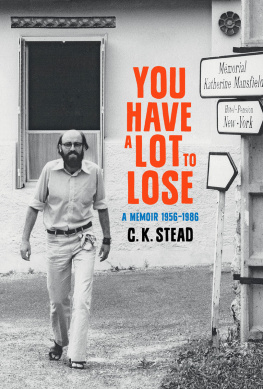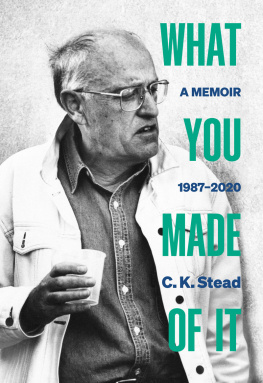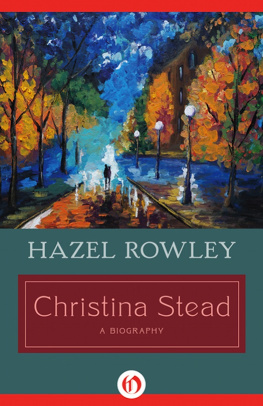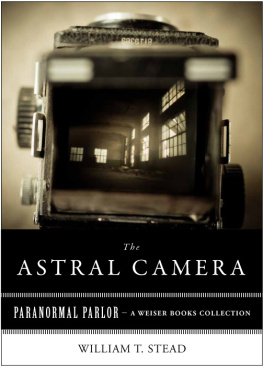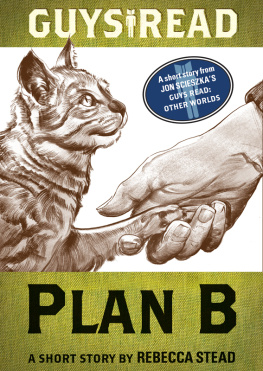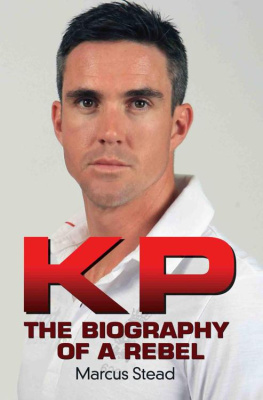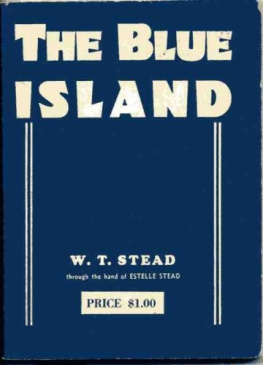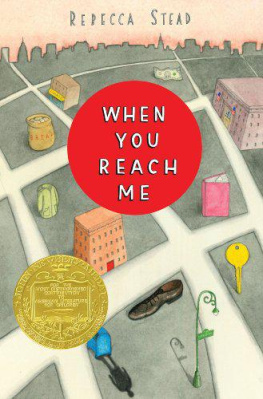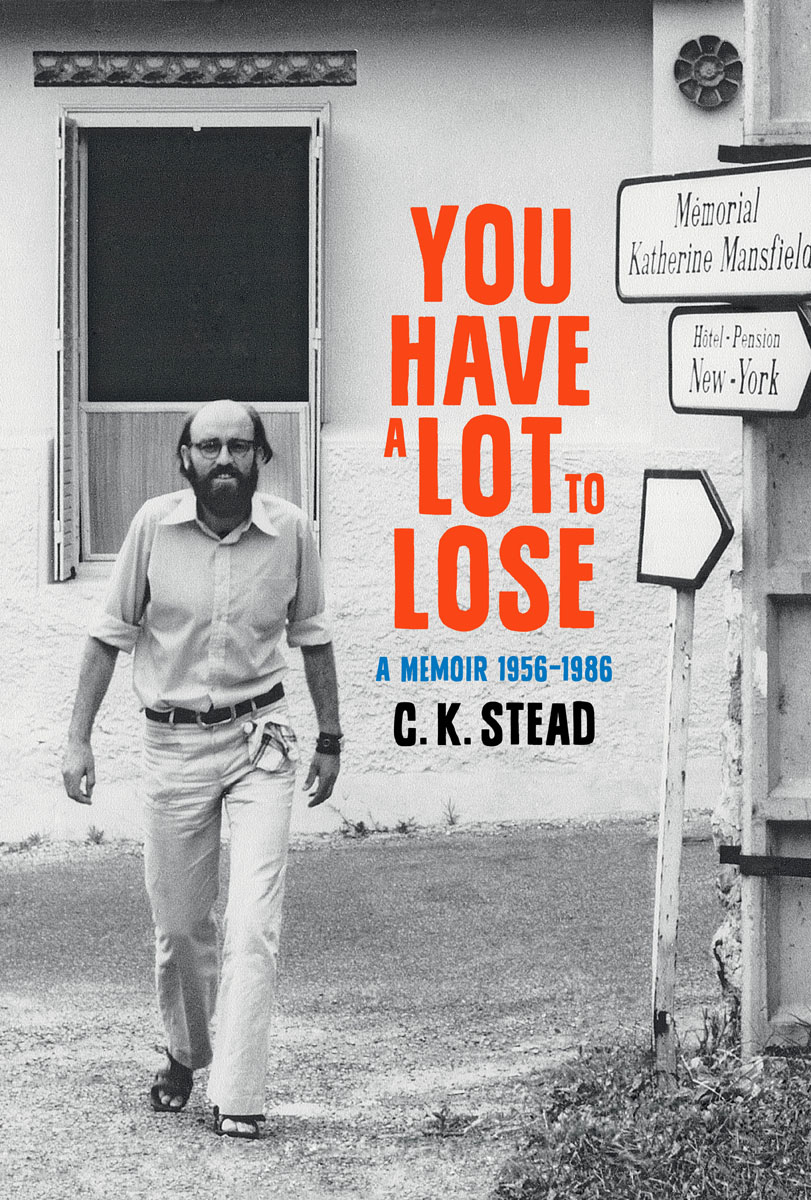

For Kay with love
The path is narrow
the tide is beginning to run
and the sun
makes light of it.
Also by C. K. Stead
Poetry
Whether the Will is Free
Crossing the Bar
Quesada
Walking Westward
Geographies
Poems of a Decade
Paris
Between
Voices
Straw into Gold
The Right Thing
Dog
The Red Tram
The Black River
Collected Poems 19512006
The Yellow Buoy: Poems 20072012
In the Mirror, and Dancing
That Derrida Whom I Derided Died
Fiction
Smiths Dream
Five for the Symbol (stories)
All Visitors Ashore
The Death of the Body
Sister Hollywood
The End of the Century at the End of the World
The Singing Whakapapa
Villa Vittoria
The Blind Blonde with Candles in her Hair (stories)
Talking about ODwyer
The Secret History of Modernism
Mansfield
My Name was Judas
Risk
The Name on the Door is Not Mine (stories)
The Necessary Angel
Memoir
South-West of Eden: A Memoir 19321956
Criticism
The New Poetic
In the Glass Case
Pound, Yeats, Eliot and the Modernist Movement
Answering to the Language
The Writer at Work
Kin of Place: Essays on 20 New Zealand Writers
Book Self: The Reader as Writer and the Writer as Critic
Shelf Life: Reviews, Replies and Reminiscences
Edited
Oxford New Zealand Short Stories (2nd series)
Measure for Measure, a Casebook
Letters and Journals of Katherine Mansfield
Collected Stories of Maurice Duggan
Faber Book of Contemporary South Pacific Stories
Werner Formans New Zealand
First published 2020
Auckland University Press
University of Auckland
Private Bag 92019
Auckland 1142
New Zealand
www.press.auckland.ac.nz
C. K. Stead, 2020
ISBN 9781776710577

A catalogue record for this book is available from the National Library of New Zealand
This book is copyright. Apart from fair dealing for the purpose of private study, research, criticism or review, as permitted under the Copyright Act, no part may be reproduced by any process without prior permission of the publisher. The moral rights of the author have been asserted.
Design by Carolyn Lewis
Cover images: Front Karl, Mansfield Menton Fellow, heading for the Villa Isola Bella, 1972; Back Karl addressing an anti-Vietnam War rally in Myers Park, Auckland, 1968; both photographed by Marti Friedlander, courtesy of the Gerrard and Marti Friedlander Charitable Trust
Printed in China through Asia Pacific Offset

Contents
Note by Way of Introduction
This is an account of myself from the end of South-West of Eden, when I first left New Zealand at the age of twenty-three, to my leaving the University of Auckland to become a full-time writer at the age of fifty-three. During all of those thirty years I had been writing and that work and the responses to it figure here. But there was always in my mind the hope I would reach a position sufficiently secure to allow me to be a writer only, with employment obligations to no one but myself. So these are my years as graduate student, teacher, professor, but equally as poet, critic, and fiction writer. In part it is the record of one struggling to get out but out of no bad place, and managing pretty well right where he was. If there was conflict between the writer and the academic, and between a commitment to New Zealand and temptations to be somewhere else, these seem not to have been destructive. They were just my life even an expression of my temperament but also in some ways illustrative of New Zealand and its place in the world during those years.
This is a literary biography a story of books and how they come about, of teaching and learning, of writers and how they interact with one another. It is a truthful account of my experience of those thirty years; nothing is deliberately misrepresented. But I have left things out, most often in the interests of economy, but sometimes for reasons of discretion, or privacy. There are significant people in my life who dont figure in these pages. I claim to be a truthful recorder, not a comprehensive one.
After the end of my university employment there is another thirty years of my writing life, a further story which may have to tell itself, and perhaps has largely done so in my books published since 1986.
Part One
Getting There
1.
Booloominbah and Beyond
Overseas
At the beginning of 1956, aged twenty-three, one year married and with a first-class honours MA from the University of Auckland, I was appointed to my first academic job, a temporary lectureship in English at the University of New England (UNE) in Armidale, New South Wales. The salary was 1,200 p.a., so at a stroke I had become what my father called a thousand-a-year man his measure of something distinctly better than merely a working wage, and which he had possibly never achieved himself. UNE had been established in 1938 as a college of the University of Sydney, but in 1954 it had been granted autonomy on condition that it undertook all the extramural teaching for the state of New South Wales, and a large part of my work would be dealing with students at a distance, setting and marking exercises, occasionally visiting outlying areas to hold weekend schools.
So Kay and I packed all our belongings, as you did then, said our goodbyes, and a sad farewell to our little 3-a-week glassed-in flat on Takapuna Beach, and set sail for a three-day journey from Auckland to Sydney on the P&O liner Orsova. It would be my first experience of Overseas.
I thought of Australia, as everyone who didnt know it well did (and perhaps does), as unstratified, democratic, egalitarian. In fact it was rife with divisions, rankings and snobberies Catholic and Protestant especially in those days, which meant roughly Irish stock and English stock, poorer and richer, lower and upper castes.
The university too seemed to be divided especially between before 1954 and after 1954, the before being appointments made when UNE was only a college of Sydney, lecturers now considered rather shop-soiled and out-of-date; the after, younger staff, better qualified academically. In the September before my appointment H. W. Piper, the universitys Foundation Professor of English, had opened his inaugural (public) lecture: I have today the duty and the honour of delivering the second inaugural lecture to be given in this University and the first from the Faculty of Arts. Previously, as a college of Sydney, Armidale had no professorial chairs and consequently lacked the status that went with them.
Next page
